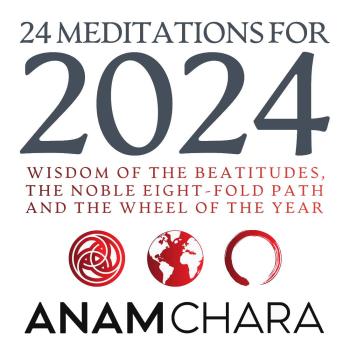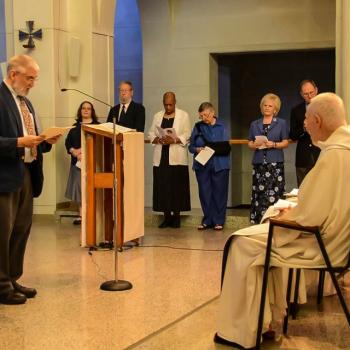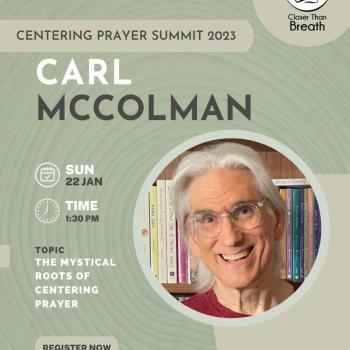Here is a list of several books I recommend for spiritual seekers — especially those who are working with a spiritual director or companion.
When I recently posted a list of books for spiritual directors, I suppose it only made sense that someone would send along this request:
Thanks for putting this list together! Do you have any books that you’d recommend for “directees?”
— Seth A. (@eastcoastokie) August 15, 2016
Thank you, Seth. I’m assuming that this list of books for directees would be aimed at persons who are relatively new to intentional contemplative spirituality and to working with a spiritual companion. So most of these books are for “beginners.” Of course, when it comes to the contemplative life, there’s a real sense in which we are all, always, beginners. So folks at all stages of the spiritual life may find some or all of these books profitable to read.
The first three books are all concerned with the practice of silent prayer, whether in a general sense or in the more structured sense of centering prayer. After that I’ve listed six other titles, each of which explores a slightly different dimension of spirituality: the importance of practice, of mindfulness, of making a retreat, crafting a personal rule of life, or committing to disciplines such as sacred reading or daily liturgical prayer. Finally, I’ve rounded off the dozen with three of my own books, since they are all written for beginners and, I hope, will be useful to anyone interested in this list.
-
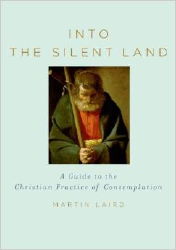
Into the Silent Land Martin Laird, Into the Silent Land — an elegant, beautifully written, and eminently practical introduction to the Christian practice of contemplation. Laird knows the tradition and has filled this book with insightful quotations from contemplative masters, including a goodly number of Eastern Orthodox writers. Laird’s insights are particularly helpful for anyone struggling with distractions (“mental clutter”) during silent prayer.
- Cynthia Bourgeault, Centering Prayer and Inner Awakening — this has more or less become a modern classic. Bourgeault provides a helpful overview of both the theory and practice of centering prayer, is willing to say so when she disagrees with Thomas Keating, and offers insightful commentary on how silent prayer leads us to healing and interior transformation. If you are going to read one book on centering prayer, this is it.
- Richard Rohr, Everything Belongs — Rohr is perhaps the most popular contemplative author alive today, and several of his books could have been included on this list. But I keep going back to this introduction to contemplation as a personal favorite, and a book that I think complements Laird and Bourgeault very nicely. The title really says it all: Rohr shows us how, in the grace of the contemplative stance, we find a spirituality that is radically inclusive.
-
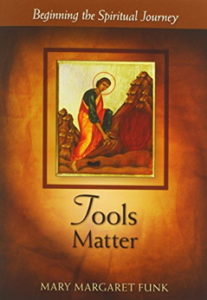
Tools Matter Mary Margaret Funk, Tools Matter: Beginning the Spiritual Journey — one of five books on the spiritual life for beginners by this Benedictine sister; all of them are worth reading but Tools Matter is a great place to start. Funk offers insight into the wisdom of the desert fathers and mothers, particularly in regard to managing our unruly thoughts and inner chatter; then she provides a useful survey of the “tools” (practices) that contemplatives use to pray.
- Thomas Merton, New Seeds of Contemplation — Merton may be most famous for his autobiographical writings, but this collection of devotional meditations on the contemplative life is arguably his most enduring contribution to the literature of spirituality. It’s also a great introduction to Merton himself, one of the most remarkable and important of twentieth century spiritual writers. Merton has a monk’s sensibility, but makes that worldview accessible to all.
- Esther de Waal, Lost in Wonder: Rediscovering the Spiritual Art of Attentiveness — de Waal is known as an interpreter of both Celtic and Benedictine spirituality, but this book is a more general treatment of an important quality for spiritual living: attentiveness, or what we now call “mindfulness.” The book is structured as a kind of literary retreat, so it also speaks to the important of making a retreat as an essential spiritual practice.
-
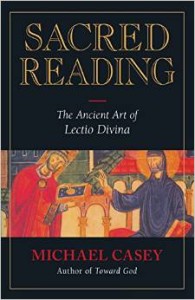
Sacred Reading Michael Casey, Sacred Reading — monastic spirituality for centuries wove together three essential practices: contemplation, the liturgy (daily prayer), and lectio divina (“sacred reading”) or the meditative, prayerful reading of scripture. Lectio has become almost as popular in our time as silent prayer, so a number of books have appeared on the topic; many are quite good, but I keep going back to this prayerful introduction, written by my favorite living Trappist author.
- Debra K. Farrington, Living Faith Day by Day — this is a book about crafting your own personal rule of life, inspired by the rules that govern monastic communities. Those of us who aren’t monks or nuns do not have the benefit of a shared community of spiritual practitioners, so we need tools to help us be disciplined as individuals or in families. A rule of life is a great accountability tool, and this book will help you to devise your own.
- Arthur Boers, Day by Day These Things We Pray: Uncovering Ancient Rhythms of Prayer — liturgical prayer (the Daily Office, the Divine Office, the Liturgy of the Hours) is a vital practice of traditional Christian spirituality, but difficult to maintain outside of a monastic setting. This book, written to promote liturgical prayer to Protestants, is useful for Christians of all denominations in making the case for daily structured prayer, even if you have to pray the Office all by yourself.
-
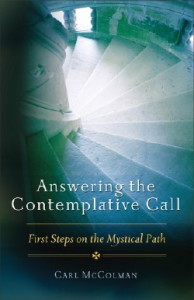
Answering the Contemplative Call Carl McColman, Answering the Contemplative Call — this book is intended for beginners on the contemplative path, assuming no prior knowledge on the part of the reader. Using the metaphor of a journey, it surveys the elements of a beginning spiritual practice, considers the idea of spiritual awakening or transformation, and invites the reader to discover the importance of silence and of disciplined prayer.
- Carl McColman, Befriending Silence — Can the spirituality of Trappist monks be applied to life outside the monastery? Absolutely, and this book explores what that might look like. Built around Bernard of Clairvaux’s idea that humility, compassion and contemplation are the three steps to truth, this book looks at the charisms (gifts) of Cistercian/Trappist monks and nuns, and reflects on how their cloistered spirituality could be a blessing for the rest of us.
- Carl McColman, The Big Book of Christian Mysticism — “mysticism” is a big topic and can seem intimidating, but this book de-mystifies mysticism, showing how it is actually a very ordinary and deeply rewarding spirituality — for all people, not just saints or priests or monks or nuns. The first part of the book explores just what is mysticism, while the second part offers initial thoughts on how to embrace mystical spirituality in your day to day life.
One final thought: whether you are reading over this list for yourself or for your directee(s), I would recommend picking just one (or at the most, two) books to start with. In my experience, people drawn to the contemplative life are often book-aholics, and as an old teacher of mine was fond of saying, reading about prayer is one of our favorite ways of avoiding actually praying. Learning the balance between interesting reading and actually fostering a daily prayer discipline is an important task for early in the spiritual formation process. With that in mind, it’s better to err on the side of caution: and only take up one book (or so) at a time.
If an eager beaver finishes a book in a month, then he or she can go on to another one (and finish off the entire list in a year). But I would recommend reading all of these books slowly — savor what these writers have to say to you.
Take several months to finish off a book, and don’t start the next one until you complete the one you’re currently reading (if it turns out you really don’t like a particular book, then make the decision to stop reading it before going on to the next one).
Remember, the contemplative life is not a race! So take your time, enjoy the books you choose to read, and above all, make time every day to pray.
Do you have a favorite contemplative book for beginners that isn’t on this list? If so, please let me know — in a comment below, or on social media. Thanks!
Enjoy reading this blog?
Click here to become a patron.





